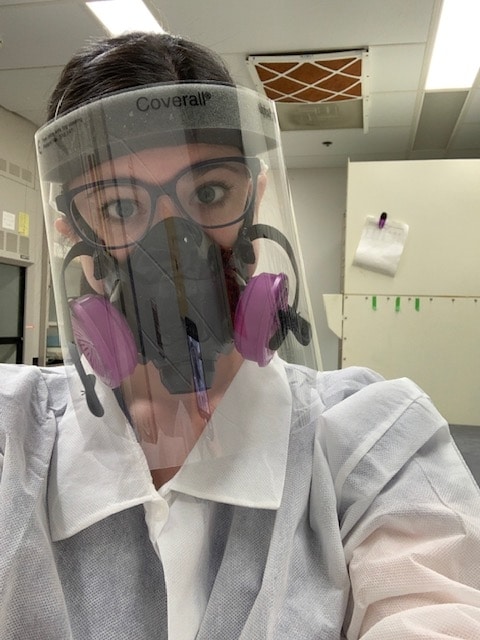PA Students Participate in Pioneering COVID-19 Study
As Rutgers University researchers launch an important clinical study tracing the spread and consequences of COVID-19 in healthcare workers and non-healthcare workers, Rutgers School of Health Professions Physician Assistant students are working right alongside them.
The viral outbreak sidelined PA students from their clinical rotations, leaving some short of credits needed for graduation.
Program Director Matthew McQuillan reached out to see if he could participate in the study, and learned that there was a need for volunteers. He arranged for students in their final year to assist, while earning elective credits.
Close to 550 health care providers and 300 non-health care workers from Rutgers, University Hospital in Newark and Robert Wood Johnson University Hospital in New Brunswick are being tracked in the study. The PA students are working on Busch Campus in Piscataway, where 150 non-healthcare workers are being seen and tested every two weeks over a period of time.
“This study all came together pretty quickly as the pandemic was developing and we were scrambling to get staff together and put our procedures in place,” said Taylor Black, a study coordinator at the Busch Campus site. “These students already had training in sample collection, collecting blood and throat swabs, so we just had to train them in the other study processes. They have been hugely integral to the success of the study at our site.”
Allison Tan, a third-year, graduating student, is one of the volunteers Wearing a disposable lab coat and mask, she draws blood from participants, records data, cleans vials and sends samples to the lab. She initially volunteered because she needed elective credits, but that requirement was later waived, making her eligible to graduate and take her board certification exam.
She continued to volunteer anyway in the high-profile study, which has garnered national attention for being the largest of its kind.
The study will trace infection rates among Rutgers workforce who regularly treat patients and for those without direct patient exposure by following the participants for six months. It also includes a series of clinical trials that will explore new drug treatments and antibody testing to provide insight into how to treat the disease and prevent its spread
‘When we were presented this opportunity, we didn’t realize how big this was going to be,” Tan said. “I feel incredibly honored to be part of this study. As a new, emerging clinician, I was initially hesitant, but it’s been great to be able to do this while I am still a student. It’s been and honor and privilege to help out.”
Jordyn Platz, also graduating this month, worked with participants on consent and also collected throat swabs and saliva, a role that required a higher level of protection – gowns, half-face respirators and face shields to protect her from the virus. She’d never worn so much protective equipment before. Nor had she been involved in a clinical research study.
“It was so interesting to see how things worked behind the scenes, and impressive to see how quickly they got the study together to respond to an urgent need,” she said. “It was really exciting and rewarding to volunteer our time for such an important research study.
The student volunteers are in their last week of the research study, as they need to begin preparing for their boards. Taking their place will be PA students in their second year of the program, who are currently undergoing training.
“I can’t say enough about these students and their professionalism, which speaks to the training they are getting in the PA program. It’s been an immense help,” Black said.
##
